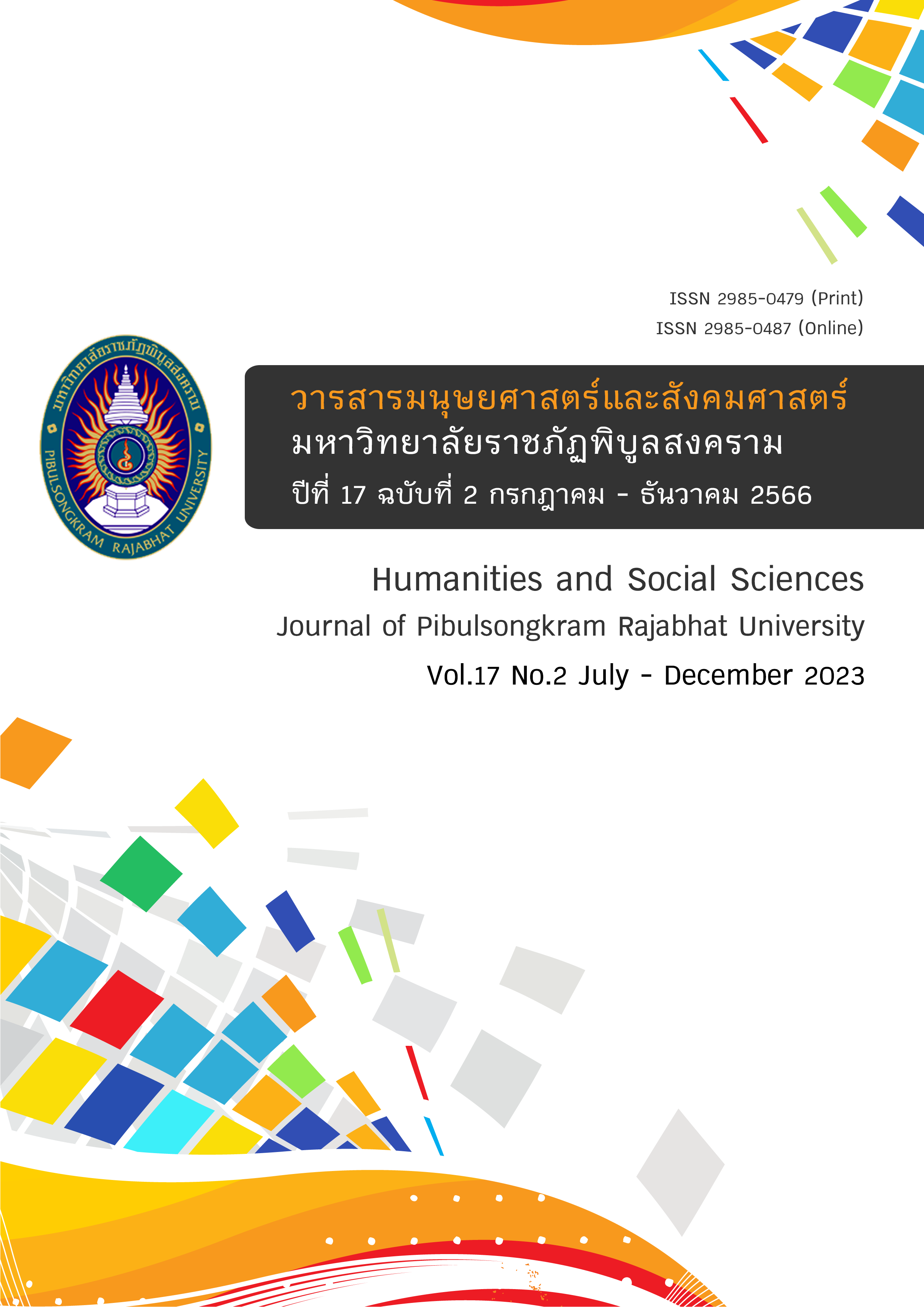The Model for Teachers’ Empowerment in Assessment-Based Learning Management to Enhance Instructional Behaviors that Reflect Positive Washback
DOI:
https://doi.org/10.14456/psruhss.2023.41Keywords:
Teacher empowerment, Assessment-based learning managementAbstract
The washback effect is both positive and negative effects of high stake testing on teacher learning management. The main objective of this research was to develop a model of teacher empowerment in assessment-based learning management to promote positive washback behaviors. The sample group consisted of 12 teachers, including Pratomsuksa 6 teachers, Mathayomsuksa 3 teachers, and Mathayomsuksa 6 teachers. The research instrument was the washback-reflecting instructional behaviors questionnaire. The data was analyzed by means, standard deviation, and Wilcoxon signed-rank test. The finding of this research was as follows: The model for teachers’ empowerment in assessment-based learning management to enhance instructional behaviors that reflect positive washback consisted of 6 components: (1) an analysis of the instructional behaviors that reflected washback; (2) an assessment-based learning management skills development (3) an assessment-based learning management (4) a monitoring and enhancement (5) an assessment of the instructional behaviors that reflects washback; and (6) the use of the assessment results which have utility, accuracy, feasibility, and propriety. The targeted teachers in using the model had more positive washback behaviors after using the model at statistical significance at the .01 level.
References
กฤติยา วงศ์ก้อม. (2547). รูปแบบการพัฒนาครูด้านการประเมินการเรียนรู้ตามแนวคิดการประเมินแบบเสริมพลังอำนาจที่สอดคล้องกับพระราชบัญญัติการศึกษาแห่งชาติ พุทธศักราช 2542 (วิทยานิพนธ์ครุศาสตรดุษฎีบัณฑิต). กรุงเทพฯ: จุฬาลงกรณ์มหาวิทยาลัย.
กฤธยากาญจน์ โตพิทักษ์. (2558). ระเบียบวิธีวิจัยทางสังคมศาสตร์ (พิมพ์ครั้งที่ 2). สงขลา: เหรียญทองการพิมพ์.
กฤธยากาญจน์ โตพิทักษ์. (2560). การเสริมพลังอำนาจครูเพื่อขับเคลื่อนรูปแบบการบูรณาการจิตสำนึกรักษ์น้ำสู่สถานศึกษาลุ่มน้ำคลองท่าแนะ จังหวัดพัทลุง. สงขลา: มหาวิทยาลัยทักษิณ.
ธัญญรัศม์ จอกสถิต. (2553). โมเดลการพัฒนาการปฏิบัติงานครู : การประยุกต์ใช้แนวคิดการประเมินครูที่เน้นการปฏิบัติงานเป็นฐานและการประเมินแบบเสริมพลังอำนาจ (วิทยานิพนธ์ครุศาสตรดุษฎีบัณฑิต). กรุงเทพฯ: จุฬาลงกรณ์มหาวิทยาลัย.
ปาริฉัตร ปิติสุทธิ. (2558). ผลการสอบระดับชาติที่มีต่อครูและนักเรียน: การวิเคราะห์ปรากฏการณ์วอชแบค (วิทยานิพนธ์ครุศาสตรมหาบัณฑิต). กรุงเทพฯ: จุฬาลงกรณ์มหาวิทยาลัย.
เพ็ญศรี บุญเดช, อมรรัตน์ พันธ์งาม, และจิณณวัตร ปะโคทัง. (2561). การพัฒนาระบบการกำกับติดตามและประเมินเสริมสร้างพลังอำนาจในการจัดการเรียนรู้ของครู สังกัดองค์การปกครองส่วนท้องถิ่น. วารสารบัณฑิตศึกษา, 15(70), 9-18.
โรสนี จริยะมาการ. (2557). การสร้างความสามารถในการประเมินของครูเพื่อพัฒนาทักษะการสื่อสารภาษาไทยของนักเรียนในสามจังหวัดชายแดนภาคใต้โดยใช้แนวคิดประเมินแบบเสริมพลังอำนาจและการสอนโดยใช้การประเมินเป็นฐาน (วิทยานิพนธ์ครุศาสตรดุษฎีบัณฑิต). กรุงเทพฯ: จุฬาลงกรณ์มหาวิทยาลัย.
วราภรณ์ แย้มทิม. (2556). การจัดการเรียนรู้โดยใช้การประเมินเป็นฐาน. ในสุวิมล ว่องวาณิช และคณะ (2556, 35-47). คู่มือปฏิบัติการครูในการประเมินสู่การเรียนการสอน สำนักงานกองทุนสนับสนุนการวิจัย (สกว.). กรุงเทพฯ: พริกหวานกราฟฟิค.
สุวิมล ว่องวาณิช. (2556). แนวคิดการปฏิบัติงานของครู. ใน สุวิมล ว่องวาณิช, คู่มือปฏิบัติการครูในการประเมินสู่การเรียนการสอน (หน้า 36-47). กรุงเทพฯ: สำนักงานกองทุนสนับสนุนการวิจัย (สกว.) และจุฬาลงกรณ์มหาวิทยาลัย.
Ahmad, S., & Rao, C. (2012). Examination Washback Effect: Syllabus, Teaching Methodology and the Learners’ Communicative Competence. Journal of Education and Practice, 3(15), 173-183.
Au, W. (2011). Teaching under the new Taylorism: High-stakes testing and the standardization of the 21st century curriculum. Journal of Curriculum Studies, 43(1), 25-45.
Fetterman, D. M. (1996). Foundations of empowerment evaluation. CA: Sage.
Ghorbani, M. R., & Neissari, M. (2015). Washback Effect of the Iranian Concours on Senior High School Students' EFL Learning Activities. Iranian Journal of Language Testing, 5(1), 1-28.
Glover, P. (2014). Do language examinations influence how teachers teach. International Online Journal of Education and Teaching, 1(3), 197-214.
Kennedy, S., & Lui, R. (2013). Washback of a high-stakes English test in China: Student and teacher perceptions. Concordia Working Papers in Applied Linguistics, 4, 22-29.
Madaus, G. F. (1988). The Influence of Testing on the Curriculum. In L. N. Tanner (Ed.), Critical Issues in Curriculum: 87th Yearbook for the National Society for the Study of Education (pp. 83-121). Chicago: University of Chicago.
Muñoz, A. P., & Álvarez, M. E. (2010). Washback of an oral assessment system in the EFL classroom. Language testing, 27(1), 33-49.
Polesel, J., Rice, S., & Dulfer, N. (2014). The impact of high-stakes testing on curriculum and pedagogy: a teacher perspective from Australia. Journal of Education Policy, 29(5), 640-657.
Wilson, A. T. (2009). Assessment based instruction applied to a course and lab in digital signal processing. In Proceedings of the 2009 ASEE Southeast Section Conference, Southern Polytechnic State University, Marietta, GA.
Downloads
Published
How to Cite
Issue
Section
License
Copyright (c) 2023 Humanities and Social Sciences Journal of Pibulsongkram Rajabhat University

This work is licensed under a Creative Commons Attribution-NonCommercial-NoDerivatives 4.0 International License.
Any articles or comments appearing in the Journal of Humanities and Social Sciences, Rajabhat Phibulsongkram University, are the intellectual property of the authors, and do not necessarily reflect the views of the editorial board. Published articles are copyrighted by the Journal of Humanities and Social Sciences, Rajabhat Phibulsongkram University.









